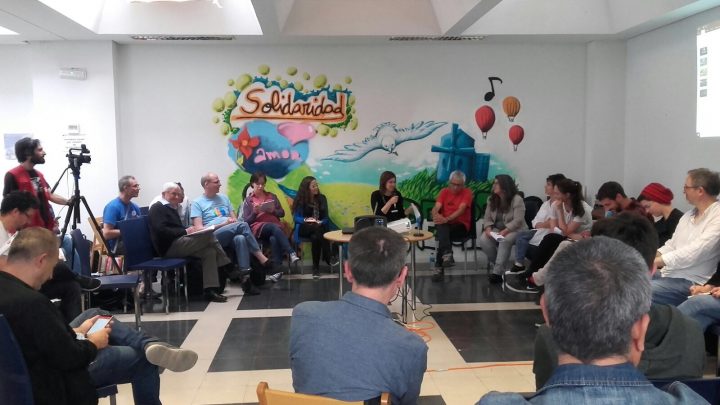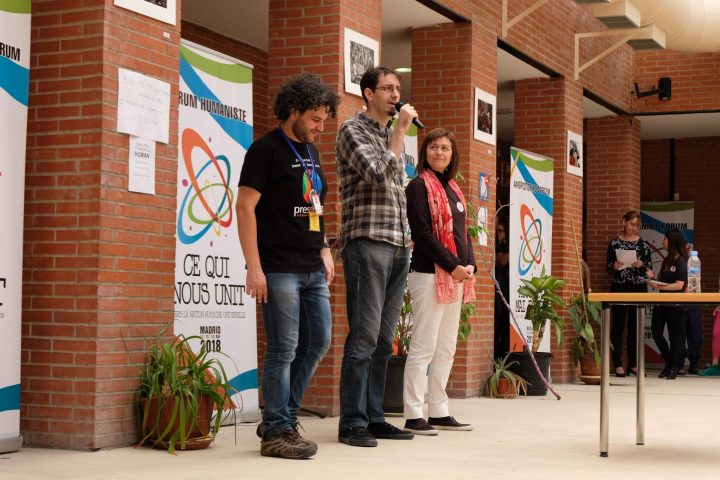Aphorism
“If they have the mass media, we will make a mass of media outlets.”
“If they have guns, we’ll have cameras.”
“If they have the banks, we have each other.”
We interviewed one of the participants of the European Humanist Forum, a speaker at the table on “Independent Media and Social Movements“. Gunther Aleksander is a philosopher, humanist and activist. Graduate in Audiovisual Communication and post-graduate in Political Philosophy. Editor of the Pressenza Agency in Brazil and producer of the QuatroV – 4V channel.
What is the role of independent media? How can they generate stories of a more humane and less violent culture?
The alternative press has a fundamental role to play, it must contribute new elements and give a new perspective, precisely because it is not as dependent as the capitalist press. We stress the need to build new cultural matrices, rather than to dispute “cultural hegemony”, as the powerful or those who want power do.
As for hegemony, it is a battle of narratives to try to “install” an “official version” accepted by the majority. The matrices are a way of building “abandoned spaces” for the powerful, where ideas and images are constructed that serve as inspiring models for the failed, persecuted and discriminated against by the system.
It is not necessarily a question of disputing the central information space, although that would be interesting, the main thing about the information matrices is to provide new models and images that reorient in a positive and integrating way everything that, until then, was accepted as “social truth”.
We stress the need to change the nihilistic journalistic approach for a more inclusive perspective that would open up the future, resignifying conflicts and redirecting the gaze towards coherent and exemplary images.
How can we reach many more people with independent media?
The first thing is to listen to people in order to connect with their needs and conflicts, today we have many means to listen to them. Either by means of direct, face-to-face communication on the spot, or via the Internet or surveys. We can “put on the antennas” to “pick up” deeply before “transmitting” massively. That makes the content more resonant and people share it more.
Today there are many ways to expand two-way communication, before we produce, we can dig and dive trying to “listen” to what people say and think. One can use “Keywords” tools to see how people are doing their searches, filter out the comments that generate the most reactions, and use them as an initial hook for a publication.
It is important to grasp what people are saying, to use this as a hook at first, and then to transfer the charge and produce changes in approach and perspective regarding the thoughtless and irrational approach that people often have. This change also extends the “viralization” of each publication.
What information is not published in the hegemonic media?
There are many issues and numerous porposals that are not published, either because they go against the economic interests that finance the capitalist press or because they have been “abandoned” because they are not in the central spaces of the big urban centres.
The hegemonic media almost always have a materialistic and economicist explanation, reneging on the cultural and existential aspects of political and social conflicts.
In general, no social movements are published that can serve as an “example” or “model” of collective action for people who are marginalized from the capitalist system. Neither is it published with a structural or process vision, everything that is published is almost always circumstantial and responds to the most transient, fragmented and anecdotal aspects, making it difficult for people to have a coherent and broad vision of what is reported.
This is also largely due to the current format of new, increasingly collaborative, discontinuous and multifocal networked media. The coherent response to this phenomenon is to create a “mass of media outlets” with a certain common project and convergent information processes.
On the theme of the Forum: “What unites us”. What common proposal could we implement in the future?
In the absence of a meaningful project, everything becomes fragmented. We propose a multi-media front that maintains its identity and autonomy, but has editorial lines that converge with the construction of a humanity without war or borders, a new human nation where the “universal declaration of human rights” becomes a tangible reality in all regions of the planet, including the peripheries and the countryside.
To this end, we propose a direct and convergent communication, with much study and reflection, based on brief presentations of exemplary actions. An open and flexible participatory front for all media, large and small, that can freely join together to create the new cultural matrices of the world to come.

Image: Joana Alomà
If today’s powerful have the mass media, we can organize a mass of media outlets
What was your participation in the European Humanist Forum?
We have tried to answer the proposals of the Humanist Forum at the journalism table, emphasizing the difference between the fight for cultural hegemony and the creation of cultural matrices that cannot be controlled and stopped by the powerful in power.
We comment that, when Marielle Franco was murdered in Brazil, they did not know that she was the seed and fruit of their exemplary actions and that she is multiplying rapidly. Briefly explained in a serious way, that rather than disputing versions of stories in the central spaces of communication, we are interested in making a mass of media outlets to disseminate inspiring examples that serve as a model.
In Brazil we are already doing it, since 2015 we work with a production company called QuatroV, we have an average of 1 to 2 million monthly views in Portuguese. About 20 volunteers from more than 10 different alternative media participate in the production of about 28 new videos per month.
In concrete terms, we propose to expand the audiovisual production of the Pressenza agency, together with other media and social movements, through the 4V programme with the opening of two new studios, one in Chile in 2018 and the other in Spain in 2019. To carry out this project we are doing a crowdfunding on the QuatroV website, where those who give their support receive a comic “winged lion’s day”. Beyond the contributions, we are looking for volunteers to join us, in collaboration with other media to write scripts for video capsules and produce some weekly TV programs collaboratively.
Finally, we will also support the creation of newsrooms and two or three ad-hoc audiovisual studios during the five months of the 2nd World March for Peace and Nonviolence, between 2019-2020.










